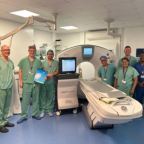
Volunteers wanted for Parkinson’s study
Researchers from Plymouth University Peninsula Schools of Medicine and Dentistry and Plymouth Hospitals NHS Trust, in collaboration with the Oxford Computational Neurosciences Lab and the world-renowned Massachusetts Institute of Technology (MIT), are looking for volunteers in the South West of England to assess a new technology for detecting Parkinson’s disease at an early stage.
This study is supported by the National Institute for Health Research (NIHR) Collaboration for Leadership in Applied Health Research and Care South West Peninsula (NIHR PenCLAHRC).
Parkinson’s is a progressive neurological condition that affects movement and speech. At present there is no cure and little understanding as to why some people develop the condition. One in 500 people in the UK, or around 127,000 individuals, currently have Parkinson’s. Worldwide, it is estimated that 10-20 million people are living with the disease and this number is expected to double by 2030. Many of these cases are undiagnosed and untreated.
One of the ways researchers are hoping to help combat Parkinson’s is by trying to find ways to detect the disease as early as possible, which could prove to be of tremendous significance to patients and clinicians alike.
The technology to be assessed is called the Body Sensor Network (BSN), a system developed over the past several years by Dr John Stein and Dr Newton Howard at the University of Oxford, MIT and the Brain Sciences Foundation. BSN is a system comprised of various body sensors worn on the arms and torso, accompanied by a microphone to record speech patterns.
The aim of the Plymouth University study is to assess the degree of accuracy with which the BSN can distinguish people with early Parkinson’s (diagnosed within the last five years) from those unaffected by the disease. In addition, the study will determine whether the system is able to reliably distinguish Parkinson’s patients from those with other neurological conditions such as Alzheimer’s disease.
Members of the research team are looking for 20 volunteers from each of these groups – a total of 60 recruits.
The study will involve a single visit to the research centre in Plymouth lasting two hours. Here, participants will be asked to perform a series of everyday tasks, such as putting on a cardigan or buttering a slice of toast while wearing the BSN system.
The study in Plymouth is being led by Dr Camille Carroll, a Consultant Neurologist and researcher at Plymouth University Peninsula Schools of Medicine and Dentistry.
She said: “BSN has the potential to be developed into an exciting and valuable tool for the early diagnosis of Parkinson’s. If successful, it can go on to play a vital role in improving the quality of life and care programmes for people with the condition. Early interventions result in better outcomes for patients.”
A Parkinson’s patient who is already taking part in the study is Tim Charlesworth, who is the Chief Executive and Harbour Master for Cattewater Harbour Commissioners in Plymouth. A leg tremor prompted a visit to his GP in 2012 and scans confirmed that he had the progressive neurological condition. Tim has been a supporter of local Parkinson’s research ever since.
He said: "The opportunity to help with research into early detection of Parkinson’s was an easy decision for me to take. Outcomes from this study can be added to the existing evidence base which will hopefully lead to more effective treatments in the future. With hindsight I now feel I spent some considerable time with mild symptoms before a diagnosis was given. Early detection may have helped me, so any research into early detection should be encouraged and supported."
For more information about getting involved with this study, please call research nurse Sandra Morgan on 01752 432047.











